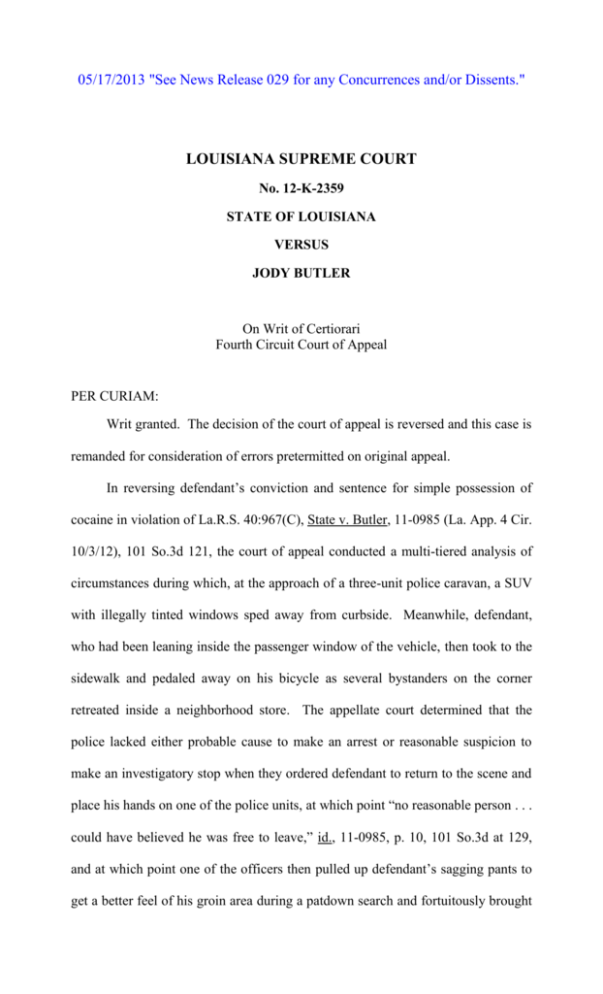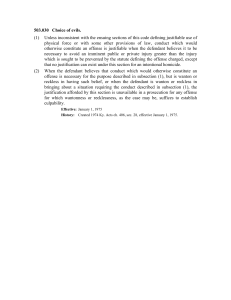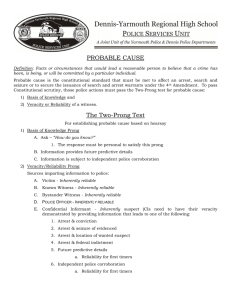State v. Butler - The Louisiana Supreme Court
advertisement

05/17/2013 "See News Release 029 for any Concurrences and/or Dissents." LOUISIANA SUPREME COURT No. 12-K-2359 STATE OF LOUISIANA VERSUS JODY BUTLER On Writ of Certiorari Fourth Circuit Court of Appeal PER CURIAM: Writ granted. The decision of the court of appeal is reversed and this case is remanded for consideration of errors pretermitted on original appeal. In reversing defendant’s conviction and sentence for simple possession of cocaine in violation of La.R.S. 40:967(C), State v. Butler, 11-0985 (La. App. 4 Cir. 10/3/12), 101 So.3d 121, the court of appeal conducted a multi-tiered analysis of circumstances during which, at the approach of a three-unit police caravan, a SUV with illegally tinted windows sped away from curbside. Meanwhile, defendant, who had been leaning inside the passenger window of the vehicle, then took to the sidewalk and pedaled away on his bicycle as several bystanders on the corner retreated inside a neighborhood store. The appellate court determined that the police lacked either probable cause to make an arrest or reasonable suspicion to make an investigatory stop when they ordered defendant to return to the scene and place his hands on one of the police units, at which point “no reasonable person . . . could have believed he was free to leave,” id., 11-0985, p. 10, 101 So.3d at 129, and at which point one of the officers then pulled up defendant’s sagging pants to get a better feel of his groin area during a patdown search and fortuitously brought into view a small packet of marijuana stuffed into one of defendant’s socks. The court of appeal further observed that, even assuming the police had reasonable suspicion for an investigatory stop, and further assuming “arguendo that being in a reputedly high crime area of the city is enough to justify a frisk of any individual stopped for questioning by the police,” id., 11-0985 at 13, 101 So.3d at 130, no authority existed in Terry v. Ohio, 392 U.S. 1, 88 S.Ct. 1868, 20 L.Ed.2d 889 (1968) or its progeny for the officer to pull up defendant’s pants as part of a selfprotective frisk for weapons. On that premise, the court of appeal held that the fortuitous discovery of the marijuana packet did not fall within the plain view doctrine justifying the lawful acquisition of probable cause. The trial court had therefore erred in denying defendant’s motion to suppress the marijuana and the rocks of cocaine subsequently found concealed in the band of his baseball cap and the coin pocket in his pants after the officer continued and intensified the search. The court of appeal accordingly reversed and remanded. The state seeks review of that decision on the premise that, in fact, there was probable cause to arrest defendant, who, by using the sidewalk to pedal away on his bicycle, violated a municipal ordinance defining a 60-day misdemeanor offense. See New Orleans Municipal Code 154-1416 (“No person 15 or more years of age shall ride a bicycle upon any sidewalk in the city nor will bicycles be allowed on sidewalks in the business district.”); La. C.Cr.P. art. 213(A)(1) (police officer may arrest without a warrant for a misdemeanor offense committed in his presence); see also Atwater v. City of Lago Vista, 532 U.S. 318, 354, 121 S. Ct. 1536, 1557,149 L.Ed.2d 549 (2001) ("If an officer has probable cause to believe an individual has committed even a very minor criminal offense in his presence, he may, without violating the Fourth Amendment, arrest the offender."). Thus, although the officers involved thought they were executing a “suspicious person 2 stop” as part of a proactive patrol of the area in which they were looking for “high profile criminals,” the state argues that in reality they were conducting a seizure based on probable cause, tantamount to an arrest for Fourth Amendment purposes, and could therefore subject defendant to a full body search for weapons or contraband incidental to that seizure without particularized concern for officer safety, although the offense for which the officers ultimately arrested defendant was not the offense for which they stopped him on probable cause. The state relies on this Court’s decision in State v. Sherman, 05-0779, p. 11 (La. 4/4/06), 931 So.2d 286, 293, which adopted the rule, under somewhat similar circumstances, that “if probable cause to arrest plus the making of a custodial arrest justifies a search of the person, then a search should be allowed when there is probable cause to arrest but no arrest.” Sherman thus upheld a search conducted by experienced narcotics officers who happened upon defendant standing next to his stalled motorcycle parked partially on the roadway in violation of one or more traffic regulations. The officers did not arrest defendant for any traffic violation, including his failure to have an operator’s license for his motorcycle, but nonetheless went inside his pocket and then arrested him for possession of the cocaine they found on his person. In upholding the search, we underscored that “the subjective intentions of the officers does not determine the reasonableness of a warrantless search incidental to arrest, where the officer did not have an intent to arrest for the offense for which probable cause objectively existed.” Sherman, 050779 at 15, 931 So.2d at 296 (discussing Whren v. United States, 517 U.S. 806, 813, 116 S.Ct. 1769, 1774, 135 L.Ed.2d 89 (1996) (“[T]he fact that the officer does not have the state of mind which is hypothecated by the reasons which provide the legal justification for the officer’s action does not invalidate the action taken as long as the circumstances, viewed objectively, justify that action. . . . Subjective 3 intentions play no role in ordinary, probable-cause Fourth Amendment analysis.”) (internal quotation marks and citation omitted); cf. Hoffa v. United States, 385 U.S. 293, 310, 87 S.Ct. 408, 417, 17 L.Ed.2d 374 (1966) ("Law enforcement officers are under no constitutional duty to call a halt to a criminal investigation the moment they have the minimum evidence to establish probable cause, a quantum of evidence which may fall far short of the amount necessary to support a criminal conviction."); Rawlings v. Kentucky, 448 U.S. 98, 111, 100 S.Ct. 2556, 2564, 65 L.Ed.2d 633 (1980) (“Where the formal arrest followed quickly on the heels of the challenged search of petitioner’s person, we do not believe it particularly important that the search preceded the arrest rather than visa versa.”); State v. Melton, 412 So.2d 1065, 1068 (La. 1982) ("When there is probable cause but no formal arrest, a limited search to preserve evidence is justified.") (citing Cupp v. Murphy, 412 U.S. 291, 93 S.Ct. 2000, 36 L.Ed.2d 900 (1973)). The court of appeal did not address the state’s argument because it was made for the first time on appeal and not advanced in the trial court as a reason for denying the motion to suppress. Butler, 11-0985 at 10, n.3, 101 So.3d at 129. It is settled that a new basis for an objection may not be urged for the first time on appeal, State v. Stoltz, 358 So.2d 1249, 1250 (La. 1978), and the rule encompasses a new basis for suppressing evidence urged for the first time on appeal as a reason for overturning a trial court’s denial of a motion to suppress. State v. Montejo, 061807, p. 22 (La. 5/11/10), 40 So.3d 952, 967 (“Louisiana courts have long held a defendant may not raise new grounds for suppressing evidence on appeal that he did not raise at the trial court in a motion to suppress.”) (citations omitted). The rule does not, however, preclude the proponent of a ruling on a motion to suppress from offering additional reasons for sustaining the result on review that do not require going outside of the record in the trial court. Cf. La.C.C.P. art. 2133(B) 4 (“A party who does not seek modification, revision, or reversal of a judgment in an appellate court, including the supreme court, may assert in support of the judgment, any argument supported by the record although he has not appealed, answered the appeal, or applied for supervisory writs.”); State v. Neisler, 93-1942 (La. 2/28/94), 633 So.2d 1224, 1233 (court of appeal “reached the right result, but for the wrong reasons”); State v. Welch, 615 So.2d 300, 302 (La. 1993) (same). An appellate court does not go outside of the record when it takes judicial notice of the statutes of this state and the ordinances of its political subdivisions. La.C.E. art. 202(B) (c) (court shall take judicial notice when requested, and may take judicial notice without request of a party, of “[o]rdinances enacted by any political subdivision of the State of Louisiana.”); cf. Word of Life Christian Center v. West, 04-1484, p. 7 (La. 4/17/06), 936 So.2d 1226, 1232 (“Ascension Parish requested that this court take judicial notice of five local ordinances and provided this court with the information needed to comply with the request. Therefore, we take judicial notice of the Ascension Parish’s local ordinances which form the basis of this suit, pursuant to La.C.E. art. 202(B).”). In the present case, we may assume that the police officers had no actual subjective intent to arrest defendant for riding his bicycle on the sidewalk in violation of the city ordinance because they were looking for “high profile criminals.” In light of Sherman, we nevertheless agree with the state that purely as an objective matter, the officers ultimately did nothing more than what the law entitled them to do by detaining defendant after observing him commit a misdemeanor offense in their presence and searching him for weapons and evidence, without regard to whether they had an articulable and particularized concern for their safety, and then arresting him, albeit not for the offense for which they initially had probable cause. 5 We therefore find no error in the trial court’s denial of the motion to suppress and thus no basis for reversing defendant’s conviction and sentence. COURT OF APPEAL DECISION REVERSED; CASE REMANDED 6





